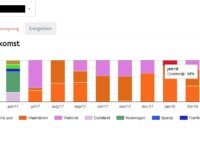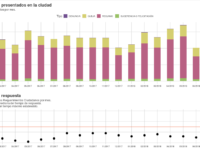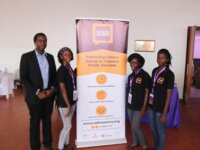The energy regulator of Flanders, Belgium, has launched a new interactive online tool, ‘GreenCheck 2.0’, allowing each citizen and company to check the characteristics of the electricity supplied to their home, such as the percentage of renewables, the country of origin and the energy source.
This way, the government caters to the increasing demand for green contracts, the need for transparency from suppliers and the government, while overall empowering the liberalization of the energy…
Case Studies
Innovations:
0
This website, as well as any data and map included herein, are without prejudice to the status of or sovereignty over any territory, to the delimitation of international frontiers and boundaries and to the name of any territory, city or area.
Bogota’s Citizen Complaints Dashboard (Tablero Control Ciudadano) is a preventive and social control web tool that displays the requirements that the citizens put before the public offices. The Citizen Complaints Dashboard gives access to public officials and citizens to the analysis and monitoring of complaints, claims and compliments entered into the System.
The Citizen Complaints Dashboard highlights alerting data related to issues regarding time of attention to the requirements as well as…
Education in Open Government is a project whose main objective is to foster social and civic competences for the exercise of one's democratic citizenship in children and young people. It involves three phases:
1) Teachers' training via a massive online open course (MOOC).
2) Implementation of educational projects in schools: for this purpose, 3 guides of Education in Open Government have been published: Primary Education, Secondary Education and High School.
3) Evaluation of the experiences.
Case Study
Citizen control strategy through the Economic Transparency Portal of the Ministry of Finance y…

The Government of Colombia has developed the Economic Transparency Portal, www.pte.gov.co, a web-based initiative to make visible to the citizens the national and regional public budgets and all public contracting. A strategy was designed with the objective of inviting citizens to carry out social control and oversight of public resources based on the data published on the Portal. Hackathons, rallies and other contests have been held in 2018 in order to achieve feedback and public participation.
East Africa has an urgent need for innovative accountability mechanisms, as many public services are inefficient and corrupt. SEMA helps to improve the quality of public service delivery, by gathering real-time citizen feedback and presenting this data in digestible formats. We use low-tech tools, such as custom-made hardware devices and interactive voice response technology, that help citizens from all backgrounds to have a voice in evaluating their public services.
Case Study
Ensuring Impartiality through Identity-Neutrality Provisions: the Case of Freedom of Information in…
The Internet has facilitated online services for citizens, but it has also facilitated Internet searches of service-seeking citizens by public officials, triggering conscious or unconscious bias. Via freedom of information (FOI) requests, academics provided evidence of this phenomenon at work. Brazil's Comptroller General (CGU) responded by implementing a check-box in its online FOI requesting system so that requesters could choose to remain anonymous. This innovation is a first for FOI regimes.
With the drafting of its first Constitution, Mexico City had a great opportunity: to explore innovative ways of crowd-sourcing this historic document, setting an example to other cities in the world on how to design important democratic experimentation at the scale of a megalopolis. The result of the entire Constitutional process is a forward-thinking document with progressive social policy and human rights at its heart. It became a legal reality in September 2018.
Case Study
Crowdsourcing alternative policy proposals’ impacts on SMEs (small and medium enterprises)
Open and inclusive policy-making builds upon the idea of designing policies by broadening the evidence base. An innovative web-based tool called SME test enables the public (citizens, business entities, economic and other interest groups) to quantify the impact of their alternative policy proposals on SMEs, in addition to substantiating their comments and proposals on a public policy proposal. Despite the tool's ease of use, it enables users to conduct more sophisticated analysis.
The Finnish Government has piloted a new innovative operating model based on co-creation and networking widely within the society. This so-called ‘The Ecosystem Forum’ aims at boosting human-centric digitalisation policy and data economy. It is a new way to formulate policies, prepare decisions and improve implementation. The forum is led by the State Secretary at Prime Minister's Office. In addition, the Prime Minister's Office has an active role in the facilitation of the network.
Case Study
“Joint effort towards best results” Result oriented management and stakeholders engagement as an…

In light of the merger of three fiscal agencies into one, the Opolskie Revenue Administration developed a management model aimed at achieving the best results which is tailored to the needs and expectations of employees and the surrounding society. The new management model obtained a better understanding of the tax administration's mission by the local community by focusing on: user-centricity; stakeholder involvement in tax office to show transparency and public involvement; and listening…



